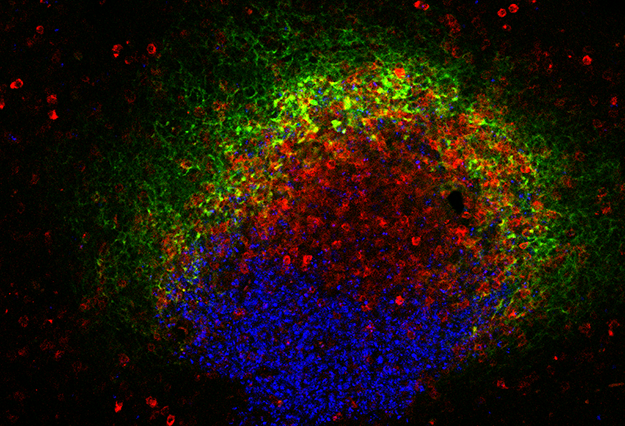
Researchers have found a new way to deliver an HIV vaccine that enhances the body's protective immune response in experiments conducted on monkeys, according to a study published in the journal Cell.
The approach—developed by a team from the La Jolla Institute for Immunology (LJI) in California—involves giving an HIV vaccine in small doses over a series of days, which the scientists say provides a better immune response than when the same drug is given all at once.
While a proven human vaccine for HIV does not yet exist, the researchers hope that their new strategy could boost effectiveness when one is developed.
"This paper demonstrates the power of the approach," Shane Crotty, lead author of the study from the Division of Vaccine Discovery at LJI, said in a statement.
When pathogens—like harmful bacteria or viruses—enter the body, our immune cells work together to remove them. Crucial to this process are cells that make antibodies—known as B cells—which move to areas in our lymph nodes known as "germinal centers."
Here they undergo a kind of "training," where those that make the most potentially effective antibodies for fighting the pathogen in question are selected by another type of cell—called T follicular helpers (TFH). The chosen few then go through another round of mutation, testing and antibody refinement.
"It's like physical training—you start off weak and then keep going back to the gym to get stronger," Kimberly Cirelli, first author of the study from LJI, said in the statement. "The germinal center is the gym and the B cells have to repeatedly go back to undergo rounds of selection to get better binding."
Normally, when B cells encounter a virus, the antibodies they produce bind to the pathogen to neutralize the threat. The problem is that HIV is a much trickier opponent. This is because its outer protein shell is covered in decoy sites that confuse the immune system, thus rendering the antibodies ineffective.
"HIV is a particularly difficult pathogen to develop a vaccine against," Crotty told Newsweek. "A major part of the challenge is that the virus rapidly mutates its surface molecules. Special antibodies, known as neutralizing antibodies, target these surface molecules and are necessary to block the virus. But all clinical trials so far over the past 20 years have failed to elicit these antibodies in humans."
To see if there was a way to address this problem, the team tried three different vaccine dose strategies on rhesus monkeys—which are currently the best animal model for studying how the immune system responds to HIV.
In the first approach, the vaccine was delivered in the traditional way with one big shot. The second strategy used an "osmotic pump," where an implant slowly released the drug over a few days. Finally, the third strategy involved giving the animals a partial dose of the vaccine every other day for just under two weeks.
As expected the traditional vaccine approach did not produce a very effective immune response and the antibodies produced were not good at neutralizing the virus. However, the two slow-release strategies yielded more promising results, leading not only to more antibodies but more effective ones.
The researchers believe this is because these approaches keep more B cells activated for longer, which gives them more time to refine their antibodies with the help of the TFH cells. In fact, over the course of the experiments, the B cells began producing neutralizing antibodies, which could bind to key areas of the HIV virus.
"Major recent advances have been made in HIV vaccine design, and data in this study and others show that it is possible to consistently elicit neutralizing antibodies with newer candidate HIV vaccine proteins under appropriate immunization conditions, which is an important step in the right direction," Crotty said. "In previous preclinical studies, getting the animals to generate neutralizing antibodies consistently and in high amounts has been difficult."
"In this new study, we found that all monkeys who were given a vaccine by slow delivery produced these neutralizing antibodies much better," he said. "Slow delivery of a vaccine produced better antibodies. We know from a previous study that a certain level of neutralizing antibodies must be present in order to protect against infection. Therefore, theoretically a significant number of these animals would have been protected."
The team says that vaccine delivery strategy may be just as important as the vaccine itself when it comes to successful outcomes.
"We found that the immune system responded quite differently to the new immunization strategy, even though the vaccine components were the same," Crotty said. "This research in monkeys is proof-of-concept that alternative immunization strategies that simply changing the kinetics of the vaccine can drastically improve immune responses."
While the use of monkeys in medical research is seen as controversial by some, Crotty says that they are an excellent model of the human immune system because they are closely related to us evolutionarily.
"Therefore, testing vaccine concepts in monkeys has been very important for HIV vaccine research, to identify the best ideas before moving forward into human clinical trials that cost many millions of dollars," he said. "Our findings can absolutely aid in the development of vaccines against HIV and other pathogens for which no vaccine exists, because they demonstrate the value of the concept of slow delivery immunization."
This article was updated to include additional comments from Shane Crotty.
Uncommon Knowledge
Newsweek is committed to challenging conventional wisdom and finding connections in the search for common ground.
Newsweek is committed to challenging conventional wisdom and finding connections in the search for common ground.
About the writer
Aristos is a Newsweek science reporter with the London, U.K., bureau. He reports on science and health topics, including; animal, ... Read more
To read how Newsweek uses AI as a newsroom tool, Click here.








